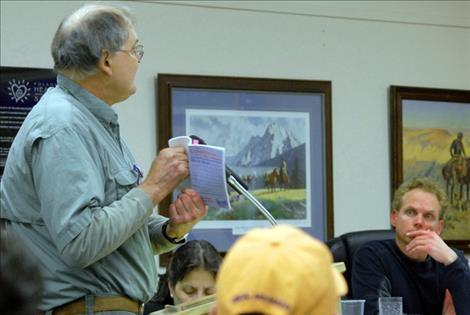Commissioners, citizens discuss water Compact
Hey savvy news reader! Thanks for choosing local.
You are now reading
1 of 3 free articles.
POLSON — The Confederated Salish and Kootenai Water Compact has been on everybody’s mind for years, but especially since the bill passed the Montana Senate the week of Feb. 28.
The Compact was on the Polson City Commissioners agenda at their March 2 meeting. The agenda was a follow-up on the Feb. 3 workshop meeting presented by Melissa Hornbein, staff attorney for the Reserved Water Rights Compact Commission, and Dan Decker, staff attorney for the Confederated Salish and Kootenai Tribes.
Shrives referenced a draft of a letter from Mayor Heather Knutson to legislators regarding the Compact. (A draft of the letter is on the City of Polson website at www.cityofpolson.com.)
Mayor Knutson said commissioners had done research and dug for information on the Compact. She had a conversation with Dr. Catherine Vandemoer, an outspoken opponent of the Compact, and noted while she appreciates the input, “My opinion stays the same.”
Knutson wanted to run the letter by the commissioners.
“I support it,” Commissioner John Campbell said, “… put (the Compact) where it belongs, in the legislature.”
Commissioner Ken Siler said everyone has their own personal considerations, “but I do think this is the best for the city.”
During public comment, local realtor Ric Smith thanked the commissioners for the letter and for sending it to legislators. However, Smith thought the letter should be stronger; and he urged commissioners to send the mayor, a council member or Shrives to Helena to testify at the legislature. Smith said it was important to thank legislators who are strongly supporting Senate Bill 262.
“Here’s the choice,” Smith said, “a known outcome today that’s a good outcome, or an unknown outcome sometime in the future.”
Realtor Dennis Duty agreed with Smith.
“It’s a huge issue for the city in terms of the potential for … no new water sources in the city and also the cost to defend existing rights,” Duty said.
He urged the commission to send a representative to the hearing to encourage legislators to vote yes on Senate Bill 262.
Paul London, who spoke on behalf of the Polson Motor Coach and RV Resort homeowners association, said the group supports the Compact.
It takes the uncertainty out for folks wanting to purchase property, London said.
Area resident Diane Speer spoke against the Compact. She said she’d heard a lot about opposition to the Compact deciding not to present at the Feb. 3 meeting. The presentations were strictly limited to municipal water.
“You can’t ignore the rest (of the Compact),” Speer said. “I’m not asking you to oppose the Compact, but as a city commission you should remain neutral. You don’t have to send a letter in, you don’t have to take sides.”
Ronan rancher Ken McAlpin said he was born and raised in Polson, “and I think I still have my citizenship.”
He presented the perspective of some of the bigger ag producers.
“Most of the decisions (ag producers) make deal with risk,” McAlpin said. “We’re very comfortable with the CSKT Compact as it’s written now. I would like to commend you guys on your letter and your support.”
To be effective, he said, the city needs a representative at the house hearing.
“(The Compact) is what this valley needs for security in the future,” McAlpin said.
Ronan rancher and irrigator Jack Horner said he’d been following the Compact for quite a while.
“The Compact does not take anybody’s water right away,” Horner said, adding that disputes can be taken before the water court.
“The Compact passed the senate last week, andmost of the concerns you hear people talking about were addressed at that time.
They’ve got the understanding that someone is going to take their water right away and that’s just not so,” Horner reiterated.
Former city commissioner Elsa Duford said she’s not in favor of the Compact.
She cited conflicting information put out about the Compact and agreed with Diane Speer that the City should remain neutral.
Compact opponent Andrew Speer noted that not all farmers and ranchers are in favor of the Compact.
Speer brought a copy of the Montana Constitution, quoting from the document that within the boundaries of the state of Montana, water belongs to all Montanans. Speer contends that in order to turn the water over to another entity, the Constitution needs to be amended.
After hearing this discussion, commissioners voted to approve the draft letter with the addition of thanking Dan Salomon, Greg Hertz and Chas Vincent for their support.
In other business, commissioners awarded the bid on the downtown water looping project.
“We bid this project last April, had irregularities and had to rebid the same project,” Shrives said.
Six companies submitted bids, and the winning bid was $737,795.38 by LHC, Inc. Shrives said this bid was a $69,000 saving from last’s year bid. One Idaho company bid, but all the other companies were Montana companies, Shrives said.
Once the engineer checks are completed, Shrives said it’s the goal to finish the project prior to summer traffic.
During city manager comments, Shrives said the city had applied for a beer and wine license for the Polson Bay Golf Course and estimated it should be issued soon.
When the city sold the all-beverage liquor license to the owners of MacKenzie River Pizza — a restaurant being built in the Ridgewater subdivision — the transaction included the unopened liquor inventory at the golf course. Shrives said the city has about two months to use the open inventory “or pour it down the sink.” Serving the opened liquor would result in about $2,000 to $4,000 in sales, Shrives said.
Shrives reported on a meeting with the Mission Bay Homeowners Association regarding paving Hawk Lane. The city had agreed to the soft cost of repaving, and the association voted to pay the hard costs — materials and labor. The project will be done this summer.
The Montana Supreme Court upheld District Judge James Manley’s decision that hiring Shrives was adequately disclosed to the public.
A group of Polson residents formed a corporation called Citizens for Open Government and sued the city in 2013.
Shrives said the lawsuit cost approximately $30,646, which was covered by the city’s insurance carrier.
The next commission meeting will be March 16 at 7 p.m. at Polson City Hall.

















